“One day’s delay is another day’s lack of progress.” – Stuart Bowen
“Delay” is the dreaded word in this fast-paced, dynamic world we live in.
If your projects experience delays more often than not, you’re not alone in this struggle.
The PMI Pulse of the Profession survey found that nearly 43% of completed projects exceeded the original budget and 48% missed the initial deadline.
Project delays are known to give headaches to even the most efficient project managers and their teams, let alone those who are new to this industry. Plans are made to ensure hassle-free project execution, but roadblocks and failure happen and derail projects from the track.
What causes project delays and how to deal with them effectively?
This post will answer all your questions to help you consistently deliver projects on time.
Let’s start with a basic understanding of what is a project delay.
What is project delay?
Project delays mean any delays in the commencement or continuation of a project due to several factors that can cause companies to miss deadlines, exceed the actual allocated budget, and even derail projects. Unexpected project delays are usually uncontrollable extend the overall project duration and necessitate a hike in project costs.
Impact of the delay of projects
Project delays cause cost overruns and reworked timelines. Is that all to it? No, there’s much more to it. Delays in projects result in a multitude of issues, and some of them are not explicit right away. Even a delay of a single day leads to additional costs that were not originally part of the budget.
Your business’s reputation could suffer a setback as well as your equation with your bosses. A delay in the project can negatively affect other projects too as you try to restrain resources needed elsewhere.
So, you can see that the adverse impact of project delays is way more than it appears on the surface.
7 Most common causes of project delay
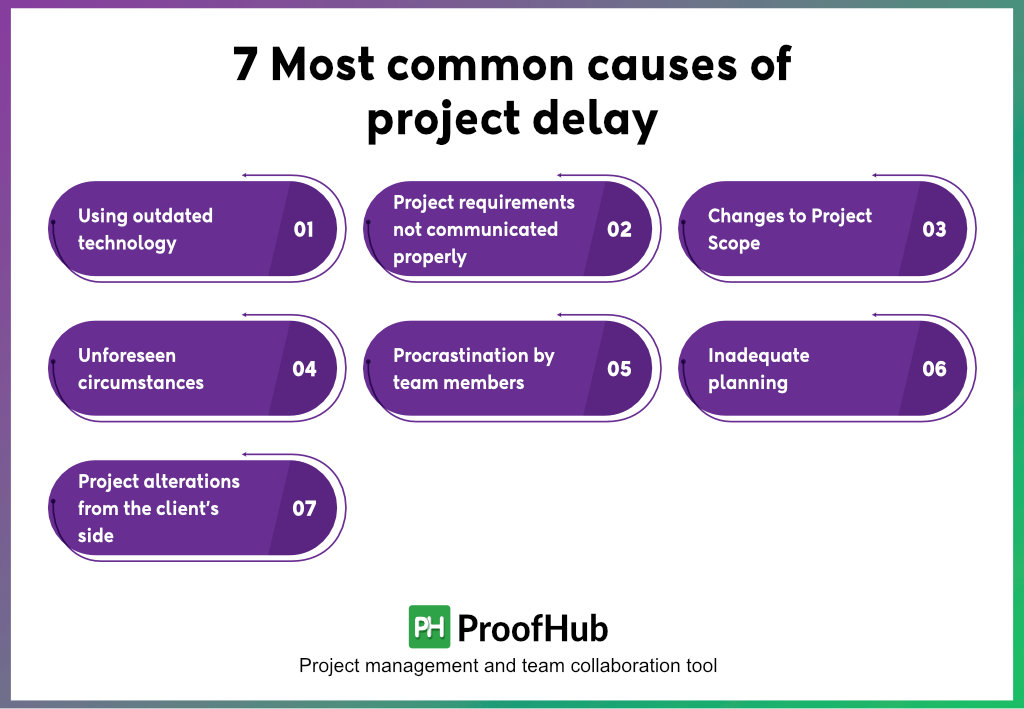
1. Using outdated technology
Using outdated and cumbersome technology is one of the main reasons for project delays. Companies continuing with traditional methods, like manual entries, spreadsheets, long email threads, etc, face various challenges, especially when managing multiple projects and remote teams simultaneously.
Gartner says that Cloud will be the centerpiece of new digital experiences, but many companies have still not realized the importance of cloud-based solutions. As a result, they are losing customers to competitors implementing cloud software.
2. Project requirements not communicated properly
According to David Grossman’s report, the cost of communication barriers stands at $62.4 million per year, per company.
Good communication is the cornerstone of the timely completion of projects, but many teams experience project delays because communication between team members, clients, and other stakeholders is not effective due to many reasons – preconceived judgments, ignorance, not using the right communication tools, distance and time zones, etc.
Vital communication falling through the cracks can obstruct work processes, inevitably causing delays in project completion.
Stay connected with your team through thebest employee communication software.
3. Changes to Project Scope
One of the biggest roadblocks to implementing Agile is unclear project scope. The Project scope outlines determining factors such as deliverables, exclusions, assumptions, and constraints. When these factors are unexpectedly changed, a project has to be reviewed, replanned, and usually restarted, and efforts made so far become irrelevant.
Changes in project scope can impact the quality, deadlines, cost, and schedule of a project. This means additional resources (time, money, human resources) will be needed as compared to those initially planned and allocated.
4. Unforeseen circumstances
One of the main project delay reasons includes unforeseen circumstances, that are beyond human control. Natural disasters can happen anytime and can cause delays in your project. The same goes for other crucial factors like political or economic climate.
Let us take a look at the example of construction project management, where 39% of projects were halted in the wake of the global pandemic i.e. COVID-19. These delays cannot be avoided and all project stakeholders must accept these.
5. Procrastination by team members
Procrastination by some of the team members is counted among the main culprits for poor performance, which eventually leads to project delays. Some people take longer than expected to complete certain tasks, which further delays the following dependent tasks.
There can be many reasons why people procrastinate – task aversiveness, work stress, anxiety, carelessness, feeling overwhelmed, etc. To avoid procrastination and project delays, businesses should identify people who often fall short of deadlines. Reasons behind their slow work should be identified and corrective action should be taken to ensure your projects do not deviate from track.
6. Inadequate planning
Poor planning and scheduling can result in project delays. If a project is not started right, it would be unrealistic to assume it will end right. Poor planning in project management translates to not laying out a clear timeline and not allocating resources adequately. Vagueness surrounds projects marred by poor planning.
Team members have no clear picture of what is expected of them and there’ll be a sense of dissociation as the project lacks clear goals and direction. This means that project delay is nothing but inevitable.
7. Project alterations from the client’s side
Many times, clients want to make changes to a project that can disrupt its progress. The entire timeline of a project needs to be restructured, which needs a lot of valuable time and other resources.
To avoid sudden alterations to a project, clients should sign off on an elaborate project description before it starts. Doing this helps project teams to execute projects in an organized way whereas unprecedented, last-minute changes from clients bring the project to a sudden halt, further extending its timeline.
Phew! So many reasons for project delays, but the good news is that delayed projects can be brought back by implementing some tried-and-tested ways to avoid them and ensure your projects are completed and delivered on time, thus delighting your clients no end.
Read on to know more about it.
How to avoid delays in projects (6 smart tips)
Alright. We’ve read what causes project delays and there is no reason for you to feel overwhelmed. The good news is that 90% of project delays can be avoided by you by incorporating a few smart strategies in your project management style.
Do you know that most project delays are not caused by working longer on some tasks but by unclear job responsibilities and miscommunication? Yes, it’s true.
So, how to keep your clients happy by avoiding project delays and building on your business’s reputation?
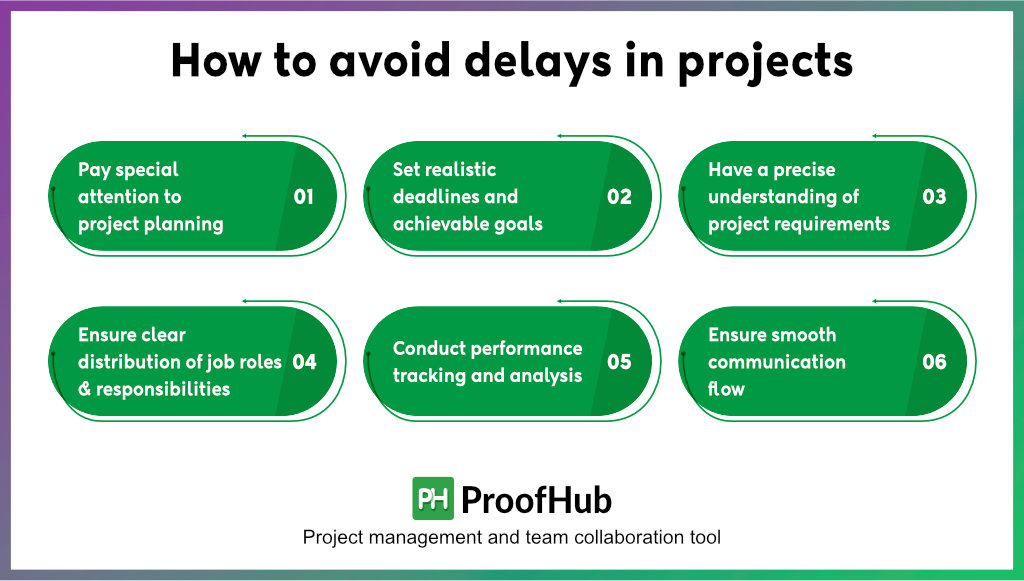
The following strategies have greatly benefitted many teams and businesses (our organization included).
1. Pay special attention to project planning
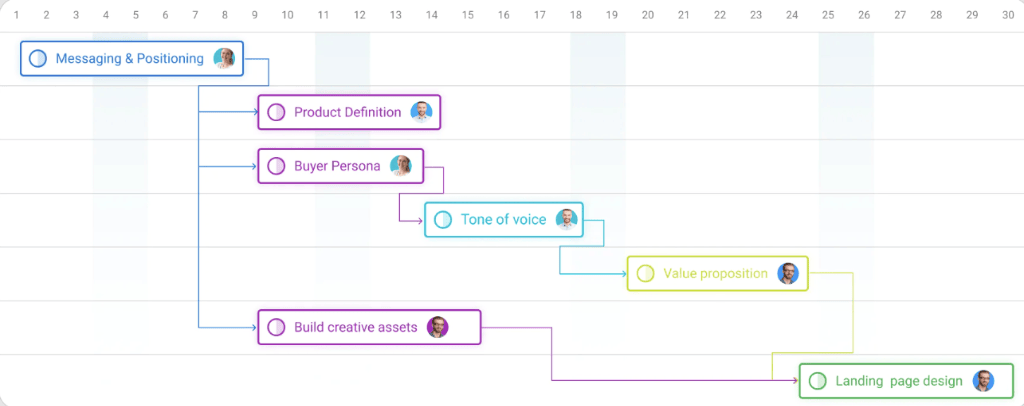
Now, the planning stage is where most project teams get it right, or wrong. This is where project managers need to get their act right to avoid delays in processing and future complications in a project. A well-developed project plan that clearly outlines a certain timeframe defined stages, and designated resources reduces the overall vagueness and risks.
Now, you might as well plan projects with pen and paper, but using a robust PM software like ProofHub can help you successfully plan and schedule projects while keeping things documented and accessible to everyone involved.
Using a reliable and highly functional project management and team collaboration tool can help you to:
- Make a task list of all the tasks required to complete a project
- Assign tasks to the right people
- Define the start and end dates for each task
- Plan work around deadlines and properly allocate resources
- Track tasks’ progress through multiple views – Board, Gantt, and Table view
- Identify potential bottlenecks and resolve them before they cause project delays
- Keep everyone in the loop with a smooth communication flow
- Organize and collaborate on all digital files and documents in a centralized location
Keep a full control on your deadlines using effective project planning software.Now plan smartly & be organized.
2. Set realistic deadlines and achievable goals

Do you get overly ambitious with your deadlines and goals? It helps to be realistic because even the most productive people have their limits. Sometimes, project managers can set unrealistic deadlines just because they want to impress clients. This blunder stresses out people.
Why overpromise and underdeliver and dent your company’s reputation?
Here’s how to set realistic deadlines for your team members that motivate your team members and not overwhelm and stress them out even before they start to work on their tasks.
- Use ProofHub’s reliable and easy-to-use task management tools to ensure a clear distribution of job roles and responsibilities.
- Analyze the individual productiveness, skills, and experience of your team members and set deadlines accordingly.
- Set time estimates for tasks to define the amount of time it should take to complete a particular task and know when the time taken exceeds the estimated time.
- Categorize and label tasks as urgent, high-priority, and low-priority tasks so assignees can organize and attempt their work accordingly.
- Use a time-tracking tool to keep track of the time spent on different tasks.
3. Have a precise understanding of project requirements

Do you understand project requirements thoroughly to determine the complexity of the project? It is the project complexity that decides the effort and duration of the project. Project managers should remember that unclear or poor understanding results in bad project estimates, which in turn leads to project delays as you’ll be thinking: Oh No!‘ I’ve badly underestimated this project.’
We don’t want this to happen to you in any case because a bad understanding of your project requirements will likely take your project nowhere before it sinks deep down. Here’s how you can better understand project requirements.
- Perform a requirement analysis before the project flags off
- Invest a considerable amount of time in understanding the requirements to ensure zero gaps in knowledge
- Create a requirement specification document
- Ask the client to sign the requirement specification
4. Ensure clear distribution of job roles & responsibilities
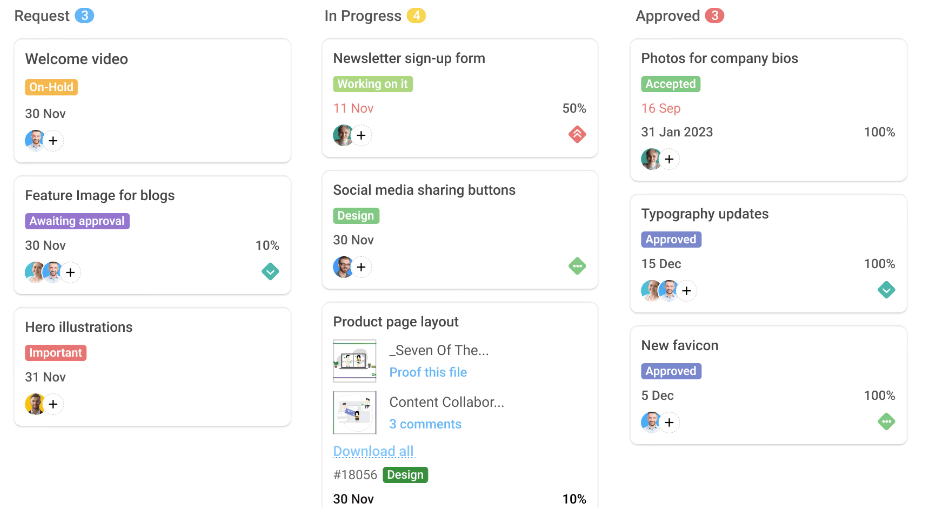
Many times projects are delayed because of confusion surrounding job roles and responsibilities. When people lack clarity on their responsibilities at the workplace, not taking ownership of the tasks at hand is a common scenario.
What will a person do if they are assigned a task that does not match their skillset?
Procrastination, poor quality of work, dragging tasks unnecessarily longer than usual. This is where your project schedule goes completely haywire.
Use a smart task management tool like ProofHub to create, allocate, and track tasks at every stage.
We recommend you implement these additional following tips to ensure everyone knows what’s expected of them.
- Hold a collective team meeting to explain what you expect from each team member.
- Discuss job responsibilities with every person in a one-on-one meeting.
Explore how ProofHub’s task management system can help you managing your resources, Checkout here – Task management system
5. Conduct performance tracking and analysis
If you track tasks within a project at every stage then there’s a little scope for project delays. No, you don’t have to check in with your team members several times a day to see what they are up to. This will make them feel a tad uncomfortable.
Instead, you should use a PM tool like ProofHub that helps you to have a Bird’s eye view of every team member’s assigned tasks. You can see how tasks are progressing and if there are potential hurdles that need to be addressed to make projects stay on track.
You might likely have to shake up some of your team members if they are going slower than expected. While you should trust your team members with their job responsibilities, make sure that people are aware that tasks need to be completed by due dates.
Here’s how to regularly track the performance of your team members.
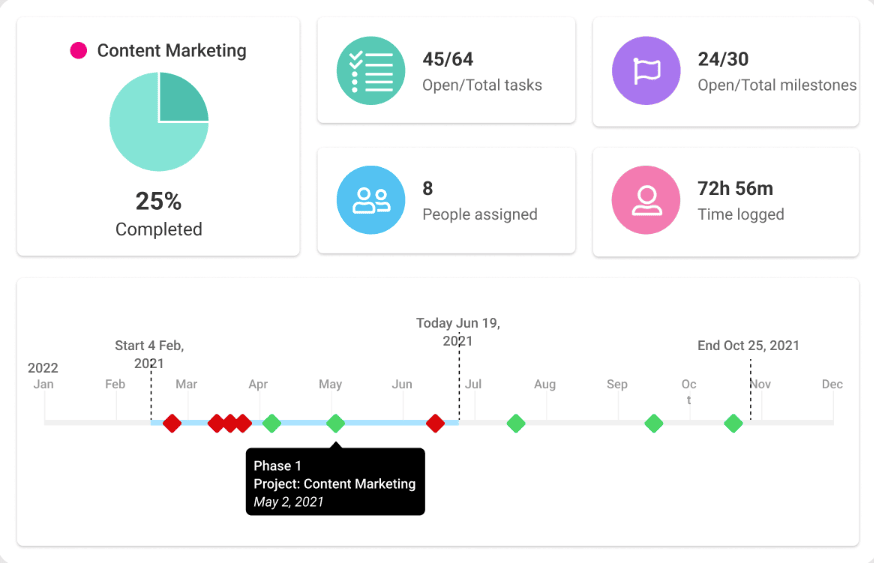
- Track overdue tasks, work-in-progress, and completed tasks for each employee across projects.
- Review work in progress regularly.
- Help employees with self-monitoring tools win inbuilt capabilities such as time tracking, Board view, Table view, and Gantt charts.
6. Ensure smooth communication flow

For timely project completion and delivery, the communication between all team members, clients, and stakeholders has to flow smoothly, without vital information falling through the cracks. Stakeholders should be kept in the loop and provided timely, detailed information on the project’s current status, achieved milestones, and team concerns to avoid derailing the project in the long run. Smooth communication helps to keep things transparent as everyone stays updated on all recent developments within the project.
ProofHub has understood this very well and offers an in-built Chat feature that allows quick information exchanges regarding projects. It can be one-on-one or between groups. As a result, there is no risk of critical information being lost, and there is no communication gap as well.
Stakeholders should also be updated on new change requests, the scope of change, and necessary changes to be taken, so they can accommodate change requests without obstructing the project schedule.
Maintaining a seamless flow of information is easy these days as there are various communication tools available –team chat apps, audio, and video conferencing tools, etc.
Project delay examples
Some typical examples of project delays are:
Example 1: A project team member working on a project is assigned a dependent task with a set time estimate of 5 hours. However, the assignee takes 3 hours (completes the task in 8 hours) more to complete this task, which results in a further delay in the start of another task by 3 hours. As a result, the delay in completion of one task causes other dependent tasks to be delayed and the entire project schedule has to be reshuffled.
Example 2: Programmers and designers can take much time improving the details of software or design, even when the improvements were not asked for by the client. This can extend the review and approval process, which might cause project delays.
How to manage project delays?
You’ve tried everything in the book to avoid project delays, but even that does not guarantee a 100% hassle-free project completion and delivery. So, what to do when your project has encountered a few roadblocks and it’s likely to be delayed? Read on to know more.
What if project delays still happen?
It’s true that even after meticulous planning and careful execution, some projects still get delayed, and it’s not a new situation for seasoned project managers. So, the question arises – what if project delays happen even after you’ve made every effort in the book to avoid them?
Legitimate questions deserve thoughtful replies. We would recommend not getting overwhelmed by such delays and avoiding making hurried decisions.
Here’s what you can do to mitigate risks caused by project delays.
- Conduct an urgent team meeting and delve deeper into the causes behind the delay while not playing the blame game.
- Deprioritize interdependent tasks if a project deadline is suffering.
- If a project gets delayed due to budgetary issues, pass the problem to board members or other concerned authorities.
- Never stop taking ownership of your mistakes and don’t hesitate to coordinate with your subordinates.
How to communicate project delays?
When project delays happen, it’s common for managers and their teams to panic and spend significant time identifying reasons and planning corrective actions. However, amid all this, it’s essential to communicate project delays to stakeholders and clients quickly so they are in the loop.
The best part in explaining project delay to them is that they can be a part of the solution you and your team are trying to devise and implement.
Here are some quick tips on how to effectively communicate project delays.
- Let clients/stakeholders know ASAP about the possible delay in the project, without waiting any longer. It’s better to express concern than to keep quiet and cause last-minute chaos.
- Keep a positive attitude when communicating project delays. Don’t look for excuses and play blame games. Instead, focus on potential solutions and focus on the direction your project is moving.
- Provide some context for project delay, but don’t dig deep into it. Prepare a plan on how to get your project back on track and discuss it with your clients as they are least interested in what went wrong and why.
- Be upfront about timeline changes even if the new delivery date is unclear. You can state that the project delivery will likely happen within 1 week or 1 month (depending on the project type and its timeline). It sets expectations and avoids further confusion and misunderstanding.
Organize and manage your work with the best project management software for your team.
The final word
Project delays are the last thing you’d want as a project manager as it causes several setbacks for the organization. As mentioned earlier, there’s a solution to every problem and project delays can be avoided too.
We would recommend you have a detailed look at each of the six strategies listed in the article and implement them in your projects ASAP. We believe that the key to avoiding project delays lies in keeping every team member in the loop by bringing the entire team together on a single collaborative platform.
ProofHub helps you have better control over teams and projects as you have a comprehensive view of all tasks and projects. You can sign up for a free 14-day trial to discover the amazing capabilities of this tool.
FAQs
What causes project delay?
Delays in project completion can happen due to various reasons – poor project planning, procrastination, scope change, last-minute changes from clients, poor communication, etc.
What are the consequences of project delay?
Delayed projects result in cost overrun, time overrun, disagreement between parties, damage to the company’s reputation, and strained relationships between team members.
How to prevent project delays?
Project delays can be avoided by – proper planning and scheduling, smooth communication flow, and clarity to everyone regarding job roles and responsibilities.

